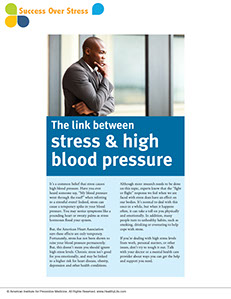SYMPTOM CHECKER
CONDITIONS
Male
Female
Child
Arm, Hand & Shoulder Concerns
Legs & Feet Concerns
Dental & Mouth Concerns
Ear & Nose
Eye Conditions
Head Conditions
Arm, Hand & Shoulder Concerns
Legs & Feet Concerns
Front
Back
Arm, Hand & Shoulder Concerns
Dental & Mouth Concerns
Ear & Nose
Eye Conditions
Head Conditions
Arm, Hand & Shoulder Concerns
Dental & Mouth Concerns
Ear & Nose
Eye Conditions
Head Conditions
Front
Back
Arm, Hand & Shoulder Concerns
Neck Links
Head & Neck Concerns
Arm, Hand & Shoulder Concerns
Neck Links
Head & Neck Concerns
Front
Back
Online Clinic
Wise Healthcare
The link between stress & high blood pressure
Print on Demand
It’s a common belief that stress causes high blood pressure. Have you ever heard someone say, “My blood pressure went through the roof!” when referring to a stressful event? Indeed, stress can cause a temporary spike in your blood pressure. You may notice symptoms like a pounding heart or sweaty palms as stress hormones flood your system.
But, the American Heart Association says these effects are only temporary. Fortunately, stress has not been shown to raise your blood pressure permanently. But, this doesn’t mean you should ignore high stress levels. Chronic stress isn’t good for you emotionally, and may be linked to a higher risk for heart disease, obesity, depression and other health conditions.
Although more research needs to be done on this topic, experts know that the “fight or flight” response we feel when we are faced with stress does have an effect on our bodies. It’s normal to deal with this once in a while, but when it happens often, it can take a toll on you physically and emotionally. In addition, many people turn to unhealthy habits, such as smoking, drinking or overeating to help cope with stress.
If you’re dealing with high stress levels from work, personal matters, or other issues, don’t try to tough it out. Talk with your doctor or a mental health care provider about ways you can get the help and support you need.
This website is not meant to substitute for expert medical advice or treatment. Follow your doctor’s or health care provider’s advice if it differs from what is given in this guide.
The American Institute for Preventive Medicine (AIPM) is not responsible for the availability or content of external sites, nor does AIPM endorse them. Also, it is the responsibility of the user to examine the copyright and licensing restrictions of external pages and to secure all necessary permission.
The content on this website is proprietary. You may not modify, copy, reproduce, republish, upload, post, transmit, or distribute, in any manner, the material on the website without the written permission of AIPM.
2021 © American Institute for Preventive Medicine - All Rights Reserved. Disclaimer | www.HealthyLife.com
















































